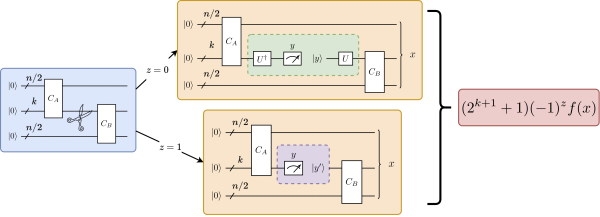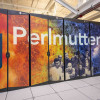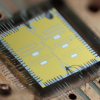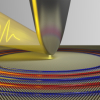Quantum@NERSC

NERSC is studying the use of neutral atom quantum computers for solving problems in quantum dynamics. (Credit: QuEra Computing)
The possibilities are wide-ranging and inspiring. In the not-too-distant future, quantum information systems are expected to revolutionize how we study disease, design new materials, understand molecular processes, analyze quantum data, and much more.
However, building world-changing quantum information technologies requires interdisciplinary research and development. Fortunately, Berkeley Lab – long known for its team approach to science – is already partnering with industry and academia to fabricate and test quantum-based devices, develop software and algorithms, build a prototype quantum computer and network, and apply these innovations for breakthroughs in a broad range of science areas.
As part of this collaborative effort, the National Energy Research Scientific Computing Center (NERSC) at Berkeley Lab is undertaking multiple endeavors in quantum information focused on topics related to the integration of quantum information technologies with HPC technologies.
In 2022, the Quantum@NERSC team established the QIS@Perlmutter program. The inaugural allocation year awarded more than 250,000 Perlmutter GPU node hours to 16 quantum information science (QIS) projects across the U.S. and beyond. The success of the program is illustrated by many exciting results. In 2023, the QIS@Perlmutter program awarded over 150,000 GPU node hours to 11 new projects resulting in many new scientific publications. The program has been extended to 2024.

A team of researchers from Xanadu used the QIS@Perlmutter program to develop a new quantum circuit cutting algorithm. The subcircuits CA and CB were simulated accross Perlmutter GPU nodes. (Credit: Lee J. O'Riordan, Xanadu)
Quantum for Science Day, first organized in October 2022, aims to bring together stakeholders from the HPC and Quantum communities and provide a forum to discuss the state of the discipline, including software and hardware advancements.
Further, the Quantum@NERSC team is investigating the potential of quantum hardware through multiple collaborative efforts. An R&D partnership with QuEra Computing is studying the use of neutral atom quantum simulators for problems in high-energy physics and chemistry.
NERSC sees its role in the budding QIS field as a centralized resource for users who want to bridge the gap between classical computing and quantum computing for applications in chemistry, physics, materials science, drug discovery, and more. Many of the science problems NERSC users are currently focused on are quantum mechanical in nature. By combining classical and quantum resources, NERSC is looking to enhance and expand these research efforts both in the near term and beyond.
For more information about QIS collaborations and resources at NERSC, contact one of the following:
Quantum Information Science @ Perlmutter
In 2022, the Quantum@NERSC team established the QIS@Perlmutter program. The inaugural allocation year awarded more than 250,000 Perlmutter GPU node hours to 16 quantum information science (QIS) projects across the U.S. and beyond and yielded exciting results. Read More »
Quantum Computing Access @ NERSC: Neutral Atoms - Call for User Proposals
Call for User Proposals for Quantum Computing Access @ NERSC: Neutral Atoms program. Read More »
Berkeley Lab Women of Quantum Computing Go Tiny in Big Ways
In the Berkeley Lab Computing Sciences Area, the future of quantum information science is being driven in part by a group of women scientists who see that future — and theirs along with it — as quite bright. Read More »
Perlmutter Results Show Progress in Quantum Information Science
The QIS@Perlmutter initiative at NERSC aims to support research in the space of quantum information science (QIS) conducted on the Perlmutter supercomputer, including quantum simulation of materials and chemical systems, algorithms for compilation of quantum circuits, error mitigation for quantum computing, and development of hybrid quantum/classical algorithms. The first phase of the project will come to an end this month, but has begun to bear fruit in the form of early science results and collaborations across the field. Read More »
First-Ever Quantum for Science Day Brings HPC and QIS Together
On October 24, stakeholders from around the field of quantum information science (QIS) gathered virtually to discuss the state of the discipline at the first-ever Quantum for Science Day, hosted by the Quantum@NERSC team at Berkeley Lab. Read More »
NERSC Pursues Growing Opportunities in Quantum Information Science
Recognizing that a combination of quantum and classical computing will be key to the application and adoption of quantum information resources, NERSC is preparing for the day QIS-enabled computing will be available to its user community. Read More »
NERSC Awards 250K GPU Node Hours on Perlmutter to 16 QIS Projects
Following a request for proposals issued in November 2021, NERSC has awarded a total of 250,000 Perlmutter GPU node hours to 16 quantum information science projects. Read More »
Record-breaking 45-qubit Quantum Computing Simulation Run at NERSC on Cori
Researchers from ETH Zurich in Switzerland used the Cori supercomputer at NERSC to simulate a 45-qubit circuit, the largest simulation of a quantum computer ever achieved. Read More »
Making Quantum ‘Waves’ in Ultrathin Materials
Running calculations at NERSC, a team of researchers co-led by Berkeley Lab have revealed how wavelike plasmons could power up a new class of sensing and photochemical technologies at the nanoscale. Read More »














